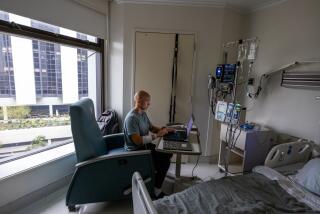Yemen president’s medical request puts U.S. in delicate spot
- Share via
Reporting from Honolulu — A request by President Ali Abdullah Saleh of Yemen to come to the U.S. for medical treatment puts the United States in a delicate position, and the White House has not yet made a formal decision about how to respond.
Granting Saleh a visa would remove a symbol of repression from the country located along the southern edge of the Arabian Peninsula, and perhaps smooth the transition to new leadership, a senior administration official said Tuesday. It would be helpful to Yemen because it would “get him out of the region,” the official said.
“If he comes without a big entourage and he’s in the hospital here, it does send a signal that he’s really out,” said the official, who spoke on condition of anonymity because he was not authorized to speak publicly.
But the White House also fears angering Yemenis if they interpret the move as providing shelter to the longtime leader. Many in Yemen want to see him punished for the government’s harsh crackdown on demonstrators over the last year.
The administration is also mindful of history. In 1979, President Carter permitted the shah of Iran to enter the U.S. for medical attention. That decision was viewed as one of the causes of the Iranian street protests that led to the attack on the U.S. Embassy and the seizure of American hostages in Tehran.
Asked whether the shah’s case was a factor in the decision on Saleh, the administration official said: “Sure, it’s on people’s minds. But we’re trying to balance things here.”
Saleh’s departure from the region might also be welcomed by pro-democracy demonstrators in Yemen because it would “send a signal that he’s not next door,” the official said.
A decision is expected within the next few days.
Josh Earnest, a White House spokesman, said in a statement that U.S. officials were considering Saleh’s request “to enter the country for the sole purpose of seeking medical treatment.”
Saleh was injured when a bomb exploded in a mosque within the presidential compound in the Yemeni capital, Sana, in June. He went to Saudi Arabia for three months for treatment.
The White House announced Sunday that the U.S. Embassy in Sana received a request from Saleh’s office that he be allowed to travel to the U.S. for medical care.
“He was really badly injured, so there’s a real medical need,” the senior administration official said.
More to Read
Sign up for Essential California
The most important California stories and recommendations in your inbox every morning.
You may occasionally receive promotional content from the Los Angeles Times.













